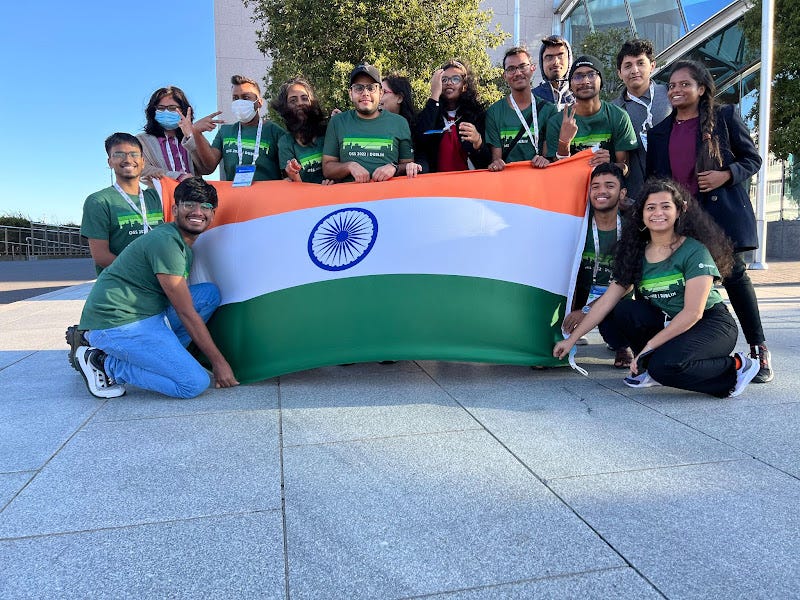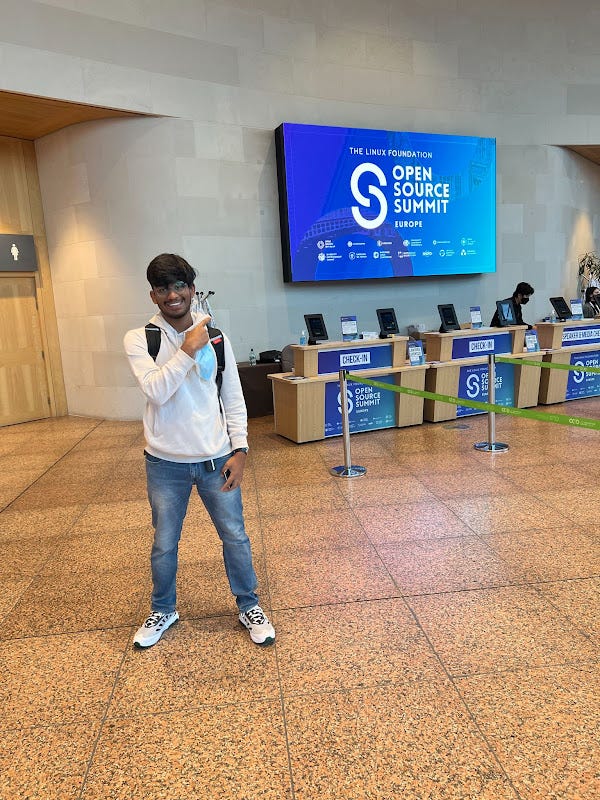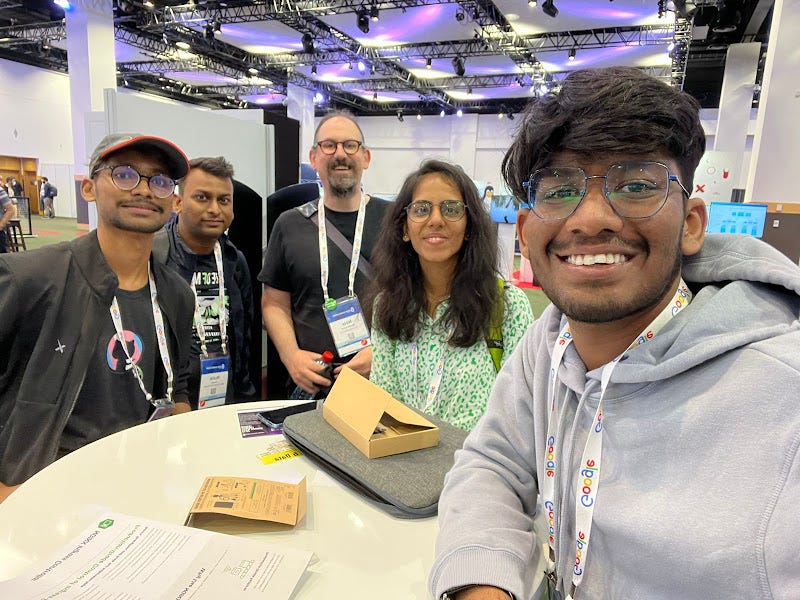Open Source Changed My Life!
Interacting with great minds, collaborating with experienced professionals, and working on projects for a greater cause are things I can’t even imagine without open source.

Recently I got a scholarship from The Linux Foundation to attend Open Source Summit Europe 2022 in Dublin, 2022. I was one of the ~20 Indians who got selected. I was invited mainly because of my work for the open-source community. In this article, I will discuss every major step I took to achieve this feat and how you can.
First contribution -
It was not a regular evening for me in my residence back then in 2019 in Delhi when I got a notification from GitHub that my first-ever Pull Request(PR) was merged into a repository, and I am officially an open-source contributor.
When I contributed for the first time, I learned through my friends that I could get a T-Shirt free of cost if I contributed to 4 projects in October. Yes, you’re guessing it correctly; it was Hacktoberfest 2019 when I contributed to open source for the first time.
Maybe the first contribution was for a t-shirt, but that introduced me to the world of open source. Since then, open source has been an integral part of my professional life and is one of the most significant factors that changed my life.
Maintaining the momentum -
After the first contribution, when you are in the moment of celebration, ensure this continues.
From my experience, here are reasons why I think you should maintain the momentum:
Practical Learning
When you contribute to any open-source project, you learn how to do things practically and eventually come out of the dreaded tutorial hell.
Work with the engineering team.
You will get a chance to work with the best minds of industries working in open-source startups, and this is an opportunity you are getting even before joining a company.
Make your resume more powerful.
A developer's resume with links to the contributions is ten times more powerful than a resume just with a description of your work.
Open yourself to opportunities.
I have worked in an open-source company since its inception, and I can say that the initial and most active members are the most active contributors to the project. Founders and the hiring teams always prefer contributors first.
As a developer, we spend our hours automating a small task that could get done in minutes, but we do it because it becomes a "seconds" thing for the next time and obviously because it seems fun.
That's what I wanted to do with my resume, and during my quest, I found Peerlist and decided to try it. I made my profile which took me less than 5 minutes.
Learn and collaborate with the best global minds
When you contribute to an open-source project, you can collaborate with the best minds across the globe, reviewing your PR, discussing solutions, and even helping on calls.
Blockers -
In my journey initially, there were a few problems I encountered contributing to new projects:
Not learning Git and GitHub perfectly
I strongly recommend learning Git and GitHub before exploring open-source projects. It's a skill that will help you immensely in your career to collaborate with teams and work on code.
Not finding projects where I can contribute
One of the biggest problems beginners face is not finding a project where they can contribute for the first time. There are plenty of ways to find an issue that fits your needs, like:
GitHub Explore: This section helps filter the projects according to the technology you want to work on.
A good first issue finder helps you find good issues with various filters.
Fear of public contributions
In starting, I always had a fear in my subconscious mind that if I contributed. That code was not perfect, then everyone would make fun of me or judge me, but with time I realized no one is perfect, everyone gets reviews, sometimes good, sometimes bad, and it is a part of the process.
Contributing without really understanding
Whenever you visit any new project, you will find the codebase overwhelming; first, that’s the point where most people give up. But to be an actual contributor, you must also be a user. You have to understand what the product actually is and what problem it is solving. With time, you will learn what different files and packages are doing and how to improve them.
As I always say, start with a readme typo and end it with a PR of a high-demand feature request.
Getting a job
As I mentioned in the article, I have worked as a Community Manager at Amplication for nearly a year. The two biggest reasons I got this job are open source and online presence.
It all started with a conversation in Twitter DM. Yuval, Founder, and CEO of Amplication, at that time, was looking for someone who could work part-time as a DevRel for them, and he contacted Pratham, my school friend, who suggested my name.
At that time, the company was not funded and did not have a big community, but one thing it always had was the solution for every developer's pain point while creating the backend. It was love at first sight for me. I always trust people more than any other factor; when Yuval and I talked initially, I saw the dedication he was putting in and the vision he had. I felt like there was an ocean of learning and experience for me to dive into. This made me very sure that if I had to start my first job, it must be this one.
We talked for the first time in July, and he also gave me an assignment at that time. I completed it, but the funding process started, and he was very busy with bigger goals. Things were not moving in terms of hiring for three months.
I knew what I had to do, so I joined their discord server and started interacting with the existing community there, helping them unofficially and ensuring some engagement was happening in the server.
I was also active on GitHub and Twitter, talking with users and sharing things about Amplication with the developer community. I was the unofficial community manager at that time. Meanwhile, they got seed funding of $6.6 Million, and Yuval started to expand the team. I was never into any job before this, and after many interviews, I was one of the first few employees Yuval hired after funding.
Early Career and Open Source involvement
Making Processes
I got an opportunity to work on creating a process on how the issues opened by the community on GitHub should be handled internally in the company. Creating the process took a lot of thinking, coffee, and reviews. Still, I am proud to say that every community issue opened in the Amplication GitHub repository is answered within 24 hours.
Helping First Timers
Working as a Community Manager for an open-source startup gives you a broad area where you can make an impact not just on the company but on a more significant level. There were a lot of things to do when I joined, but one thing I wanted to do consistently was to help first-time contributors as much as I could. So, I started an exclusive campaign in Amplication to help first-timers to contribute to open source. The main three points of the campaign were:
Providing good first-time issues to contribute.
Providing priority support from the engineering team wherever needed in discord.
Celebrating and rewarding the first PR with some cool swags.
This made our onboarding process for any new contributor very smooth, and we got 100+ contributors through several campaigns we did in the past year. It was a win-win situation for everyone.
Meetups from Scratch
Working in a startup from the very beginning means you have to do everything from scratch, and you will make processes and choose everything for people coming after you. This means you have a responsibility to choose the best possible thing.
While deciding where the meetup should be streamed, I had one thing very clear in mind these meetups should not be limited to people only in our community. Still, they should be open to every person in the world who wants to learn about that particular topic.
After brainstorming and a little research, I learned about a tool called Streamyard which can stream the session simultaneously on nearly every platform where our community exists. This made my vision of reaching out to every open-source community member who wants to learn something and make a bigger impact possible.
Opportunities and Achievements
Getting a Remote Job
I always say this, I feel honored to work at a startup like Amplication, where everybody treats you like your family, your personal growth matters a lot, and you work on something that makes an impact. It was not possible without open source.
Visiting Israel
I got a chance to visit Tel Aviv, Israel(HQ of Amplication) in June 2022. It was my first solo international trip. It was a fantastic experience for me. That was my first-ever visit to the office because this was my first job, and I was working remotely. I learned so many new things during that visit and so many memories to cherish.
After working for more than eight months, I finally met Yuval and the rest of the team.
Attending Open Source Summit Europe 2022
The Linux Foundation gives scholarships to those who have impacted the open-source community through their work and provides them with travel funding and a conference ticket. I was among the ~20 Indians selected for this scholarship this year.
They selected me because of my work for open-source communities, from managing communities over different platforms, creating processes, and onboarding first-time contributors to the open-source world. I met many people with many experiences and learned things that would be impossible to learn from home or anywhere else.
Apart from conferences, all thanks to the Linux Foundation, there were many onsite events like river Liffey boat tours, Dublin bus tours, all-attendee parties, and much more. Enjoyed every bit of it.
Many personal achievements
There were many personal achievements I made in the last year. I took my parents on their first flight and international trip to Nepal. I somehow became the primary bread earner for the family and supported them during the hard times that came due to covid. I started participating in public speaking events and learned a lot of new things. Finally made a successful (seems to me) transition from a new graduate to a professional.
Final Thoughts
Being a part of and leading an open-source community is an amazing opportunity. Interacting with great minds, collaborating with experienced professionals, and working on projects for a greater cause are things I can’t even imagine without open source. It all started from a minor readme fix. Open-source changed my life in every perspective and can also change yours.







